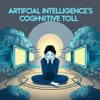In the article, the author examines how reliance on advanced artificial intelligence (AI) systems is introducing an unforeseen cognitive cost to human users. The core argument is that when we outsource our thinking—problem solving, critical evaluation, memory recall—to AI tools, we begin to offload mental work in ways that can weaken the cognitive capacities designed to keep us sharp. Research cited in the piece shows that users of large-language models (LLMs) often exhibit reduced brain-activity, diminished memory retention and weaker critical thinking when compared with those who engage tasks unaided.
One key concern the author raises is the concept of algorithmic deference—the tendency of people to accept AI suggestions without sufficient scrutiny, thereby eroding the habit of questioning, reasoning and independent analysis. The article highlights studies in workplaces and educational settings where frequent AI-use correlates with lower engagement in critical thinking and less confidence in one’s own cognitive abilities.
Furthermore, the author warns that this cognitive toll isn’t just individual—it may have broad societal ramifications. If large segments of the workforce and general public begin to rely heavily on AI for thinking, decision-making and creativity, we risk a generational decline in intellectual skills such as synthesis, judgement and memory. The article argues that this trend might lead to a narrowing of thought diversity, shallower engagement with content, and weakened capacity to deal with novel or ambiguous problems.
Finally, the piece offers suggestions for mitigating these risks: preserve spaces where humans think unaided; consciously use AI as a tool not a substitute; design AI systems that prompt reflection rather than passive acceptance; and invest in cognitive training and literacy so that people maintain their thinking muscles. The takeaway is clear: AI promises amplification of human capabilities—but if used without care, it may silently diminish what it means to think.


